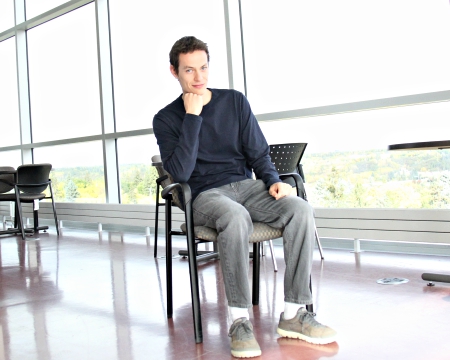
GOALS: Carrigy's goal is to see the bacteria-killer inexpensively produced on a large scale with long-term stability at temperatures encountered in Africa.
(EDMONTON) A mechanical engineering grad student in Edmonton plans to do battle with an invisible and deadly foe in Kenya. No, this isn't an international game of World of Warcraft. But it does have the potential to become a game-changer in public health.
PhD student Nicholas Carrigy is working on a project as part of a research team under the supervision of mechanical engineering professor Reinhard Vehring. "This project is interesting both in its humanitarian and engineering aspects," Carrigy says. "It has the potential to save lives."
The team is pursuing bacteriophage therapy, an emerging tool in health research that has the potential to address the rise of antibiotic resistance. A bacteriophage is a virus that attacks a bacterium, injecting it with viral DNA. The virus reproduces inside the bacterium, which bursts, releasing more viruses that attack more bacteria.
Vehring has recently secured funding to develop new bacteriophage technologies that hold the potential to combat food-borne bacteria. In particular, he envisions dry powder bacteriophage products that can be applied to foods, like poultry, to decrease the bacterial load on the food before it is delivered to consumers.
The team is working with collaborators in Kenya, where a particular food-borne bacteria, Campylobacter jejuni, is prevalent. In that African country, C. jejuni kills nearly nine per cent of people it infects, most of them children.
Vehring's Particle Engineering Group was the first in the world to demonstrate that bacteriophage can be manufactured in a dry powder via a process called spray drying. Now the team is turning its attention to the C. jejuni project in Kenya.
Carrigy's role is to create a dry powder bacteriophage product, determining the parameters for the spray drying process. He's also working on a protocol to measure the stability of the product.
"Our goal is to see that it can be inexpensively produced on a large scale and that it has long-term stability at temperatures encountered in Kenya." Carrigy says. Stabilized in a dry powder, the bacteriophage won't require refrigeration and will tolerate high temperatures, which is important for its success in the east African country.
The team is working with the University of Nottingham in the U.K. and the Kenya Medical Research Institute. Ultimately the goal is to have the powder manufactured in Kenya using the technology Vehring and his team develop. Vehring hopes to bring the technology to Kenya some time in 2019. Meanwhile, collaborators in Kenya are busy laying the groundwork for its introduction.
"Our collaborators, linked with us through the non-profit organization Phages for Global Health, are engaging with policymakers, consumers, and processors in Kenya," explains Carrigy. "We need to ensure that the product gets to market, is accepted by the local culture, and can be manufactured locally."
Carrigy has also had opportunities to travel during his graduate work, including to a conference in the French Riviera where he presented work towards bacteriophage aerosol therapy for respiratory applications, and a six-month research exchange at the University of Sydney in Australia. Most recently, he attended the Evergreen Meeting in Washington State, a conference devoted exclusively to the latest global developments in bacteriophage research.
Carrigy says his graduate work has been very satisfying. "You are given a lot of responsibility to lead your own projects and design your own experiments," he says, "but there is support and feedback from your lab-mates and supervisor."
The team is taking important steps to improve global public health through engineering research. "We're always looking for new, enthusiastic students," adds Carrigy's supervisor, Reinhard Vehring.